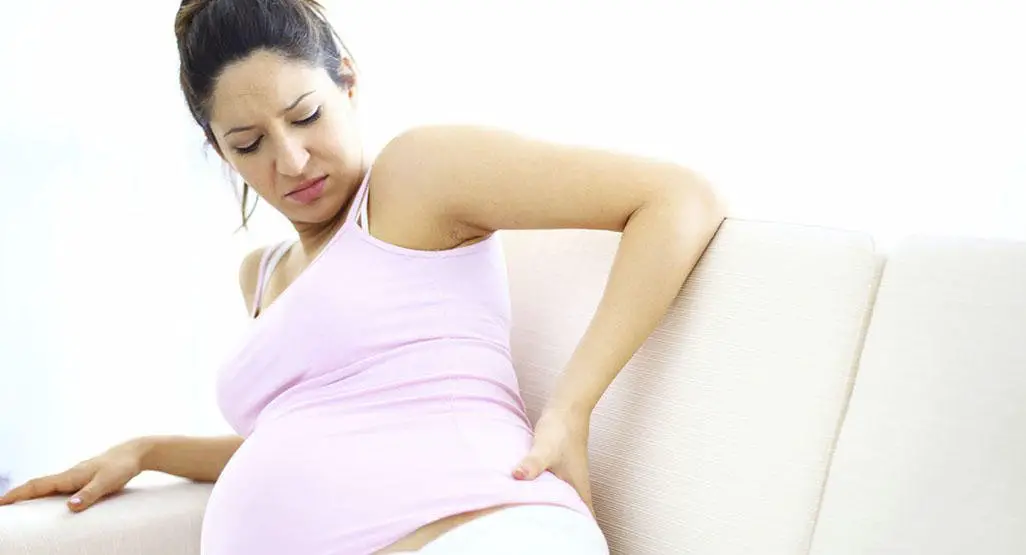When To Worry About Pregnancy Back Pain
Low back pain that’s worse when you’re standing but eases once you sit or lie down is considered normal during pregnancy. But talk to your doctor if the pain starts to radiate down your legs into your calves or feet interferes with daily activities or causes fever, chills,weight loss, weakness, or sensory issues.
What Causes Back Labor Pains
The main back labor cause is babys position during labor. For most women who experience back labor, baby is positioned sunny-side up. That means your babys head is nestled down by your cervix, but hes facing your stomach instead of your back.
If your baby is facing your tummy, the back of his head, which is the hardest part, pushes down on your spine and tailbone. This presses on the nerves in the spine, causing pain.
When babies are positioned head down and face your back, with their chin tucked up into their chest , their heads are less likely to press on the spine and cause back labor pain. This position is also ideal for labor, because the smallest and most compact part of your baby his head is lined up to fit through the pelvis as easily as possible.
Fortunately, odds are good that your baby will flip all on his own. While up to 20 percent of babies in the heads-down position face sunny-side up at term, only about 5 percent of babies havent turned around the other way by the time Mom delivers.
Its possible youll still experience back labor even if your baby is facing your back. That may be because he was sunny-side up but recently flipped, leaving your back feeling extra sensitive. Other times, it just seems to be the luck of the draw: Some women simply experience more labor pain in the back than others.
Contact Your Family Doctor If:
- Your pain worsens or does not go away after 2 weeks. Back pain could be a sign of preterm labor.
- You lose feeling in your back, legs, pelvis, or genital area.
- You have a fever, a burning feeling when you pee, or vaginal bleeding. You may have a urinary tract infection or kidney infection.
- You have an injury or trauma that results in back pain.
Read Also: Is Aleve Good For Lower Back Pain
Exercise The Pain Away
Staying mobile can really help with back pain as it keeps your muscles from getting too tight, says Cynthia Rebong, a midwife at Midwifery Care North Don River Valley and a yoga and Pilates instructor. Some forms of phsycial activity can become uncomfortable during pregnancy, but Rebong recommends swimming as a pregnancy-friendly way to keep moving.
Can a maternity belt solve your pregnancy pains? Mickeler suggests focusing on your glutes when you exercise. We have this anterior shift in the pelvis, and now were tucking our butt under, so our butts getting really tight, and super, super weak, she explains. And weak glutes can wreak havoc with your lower back because they force other muscles, like your hip flexors, to do the work for them. Mickeler says exercises like squats, lunges, glute kickbacks or bridges can all help support your posture by strengthening not only your glutes but your back, hamstrings and calves, which will help prevent back pain.
If you already have low-back pain, manual osteopathic practitioner Riki Richter, co-owner of Synergy Sports Medicine and Rehabilitation in Toronto, recommends doing squats against a wall, which will give you support at the same time as minimizing that lower back bend. She also suggests cat pose, which will help keep that low-back area flexible. And if you have pain around the dimples in your low back, butt, hips or pubic bone, choose fitness classes that dont involve forward bending, as that can be painful, says Mickeler.
Risk Factors For Back Pain During Pregnancy

Back pain is incredibly common, but some risk factors do increase your chance of experiencing it .
Some of these risk factors are:
- Previous experience with back pain before pregnancy.
- Back pain during a previous pregnancy.
- Weak abdominal muscles.
- Pain in the center of the lower back.
- A deep ache in the buttocks.
- Pain that extends through the thighs and legs.
While sharp pains can certainly happen during pregnancy, this type of pain is much less common. Sharp back pain that shoots down the legs can also be related to nerve pain or a more serious condition. It is best to consult your doctor or healthcare provider immediately if you are experiencing sharp pains.
Also Check: Is Aleve Or Ibuprofen Better For Back Pain
Rib Pain During Pregnancy
If you are currently in the very early stages of pregnancy, it is possible that you will start to notice discomfort in your ribs or side, as a result of your growing uterus. During pregnancy, one of the most common areas of pain and discomfort is the ribs. This can be uncomfortable and can mean that sleeping on your side becomes difficult. It can be especially painful for those with existing musculoskeletal problems.
What causes rib pain during pregnancy?
Rib pain during pregnancy can be a sign of something wrong. In the vast majority of cases the cause is harmless . Also your growing uterus can cause further strain. Rib pain tends to be most present during the end of your pregnancy as everything stretches. There are other possible causes of rib pain during pregnancy:
- Hormones are responsible for changes in joints, muscles, and ligaments, which can cause the ribs to expand.
- The cartilage attached to your ribs can loosen and expand, causing inflammation in the area.
- As your uterus expands, it increases pressure on your rib cage.
- The powerful kicks of your baby, moving, stretching, and punching can also cause rib pain.
- The increase of your breast can put more pressure on your rib cage, altering your posture and causing pain in both the ribs and back.
How does rib pain change during pregnancy?
What you can do to relieve rib pain during pregnancy.
You can try the following things to relieve rib pain during pregnancy:
Causes Of Back Pain In Pregnant Women
Pregnancy back pain typically happens where the pelvis meets your spine, at the sacroiliac joint.
There are many possible reasons why it happens. Here are some of the more likely causes:
- Weight gain.During a healthy pregnancy, women typically gain between 25 and 35 pounds. The spine has to support that weight. That can cause lower back pain. The weight of the growingbabyand uterus also puts pressure on the blood vessels and nerves in the pelvis and back.
- Posture changes.Pregnancy shifts your center of gravity. As a result, you may gradually — even without noticing — begin to adjust your posture and the way you move. This may result in back pain or strain.
- Hormone changes.During pregnancy, your body makes a hormone called relaxin that allows ligaments in the pelvic area to relax and the joints to become looser in preparation for the birth process. The same hormone can cause ligaments that support the spine to loosen, leading to instability and pain.
- Muscle separation.As the uterus expands, two parallel sheets of muscles , which run from the rib cage to the pubic bone, may separate along the center seam. This separation may worsen back pain.
- Stress. Emotional stress can cause muscle tension in the back, which may be felt as back pain or back spasms. You may find that you experience an increase in back pain during stressful periods of your pregnancy.
Also Check: Ibuprofen For Back Pain Dosage
Exercises For Back Pain During Pregnancy
Back pain during pregnancy is very common and its no surprise. Youve got the influx of hormones that loosen certain ligaments, the weight gain in your tummy pulling your back muscles forward and downward, and your pelvic bones shifting. All of these changes in your body are a recipe for discomfort.
Just because theres good reason for back pain during pregnancy doesnt mean you have to suffer through it. Use these simple exercises to help you feel better and avoid unnecessary pain medications. As a bonus, these moves will also get you stronger and better prepared for labor and delivery.
These exercises are safe and gentle enough for any mom-to-be during any phase of pregnancy. But one word of caution: If you had not been exercising before pregnancy, then start with just 1 set of each of these exercises and work your way up as you become stronger. You may be a little sore the next day if these moves are brand new to you.
Suffering from a sore neck, back and shoulders? Get our mobility guide to ease pain and soreness.
You can choose to complete these exercises as a whole back strengthening and stretching circuit, or you can pick your favorites and add them to your regular workout routine.
As with all exercises, make sure youre breathing during each movement and working slowly with control.
Back Labor Vs Back Pain: How Can You Tell The Difference
With the weight of your growing uterus shifting your weight forward and the pregnancy hormone relaxin loosening your joints, back pain is a common pregnancy complaint. It often starts in the second to third trimester and gets worse as pregnancy progresses. With normal pregnancy back pain, your lower back and upper hips feel constantly achy, stiff or sore.
Back labor, on the other hand, is much more intense back pain that begins when youre in labor. While you might feel consistent back labor pain until you deliver, youll likely notice it gets much worse during contractions and noticeably subsides between contractions.
You May Like: Does Aleve Help Back Pain
Muscle Overgrowth And Hormonal Changes
Under the influence of chemical relaxation, the stationary pelvic joints and intervertebral tendons begin to relax and grow. This is the way in which the body plans the upcoming birth. Moreover, due to intrauterine development, the abdominal muscles also expand and weaken. Thus, the back muscles begin to work for two, which additionally causes pain in the lower back and back.
What Are Some Symptoms Of Back Pain During Pregnancy
The symptoms of back pain during pregnancy are very similar to the symptoms of back pain prior to pregnancy. Some of the symptoms include:
- Pain in the center of your back
- Pain above or at the sides of the waistline
- Pain over the pubic bone
- Pain in the buttocks or thighs
- Pain that can radiate to the legs
- Stiffness or discomfort after sitting or standing for long period of time
Read Also: Aleve Or Advil For Lower Back Pain
Strap On A Maternity Belt
If you have pelvic girdle pain around your middle lower back and hips, a maternity belt may relieve your pain. This support garment does the work of the ligaments, muscles and fascia of the girdle area, explains Richter. But, she cautions, it should not be worn all of the time, because those muscles will stop working and will need to be retrained after you have your baby. I usually recommend that clients wear them during more taxing activitiessuch as activities with lots of bending, lifting, walking or standingjust so theyre not in discomfort, she explains. And then I give them exercises to try and resolve the issue.
Mickeler warns against wearing the belts too tightly, which can contribute to pelvic organ prolapse. Because of this, its best to have a practitioner guide you on how to use one.
Read more:
How To Reduce Back Pain During Pregnancy

Back pain during pregnancy is often something that you cant get away from. However, this is one of the most debilitating things that can occur in pregnancy and if you can take steps to reduce it, pregnancy will be less stressful.
Back pain can be reduced with a few simple steps that you may have thought of. Here is a look at some of the best ways to reduce back pain during pregnancy and enable you to enjoy this period in your life.
Don’t Miss: Back Pain Cleveland Clinic
Back Labor Vs Regular Labor
Labor contractions can cause pain in just the lower abdomen or the lower abdomen and the back. Normal labor contractions feel like intense menstrual cramps that come and go with increasing intensity. Regular contractions are only slightly felt in the back.
Back labor is much more intense pain in your lower back. The pain in your back tends to continue between contractions and gets particularly uncomfortable at the height of a contraction.
Piriformis Stretch With Chirp Wheel
You May Like: Does Aleve Work For Back Pain
Avascular Necrosis Of The Femoral Head
Biological changes in pregnancy resulting in high levels of natural steroids, including adrenocorticoid, estrogen, and progesterone hormones, combined with weight gain, may cause increased joint pressure and muscle strain in the hip. These changes may result in a condition called avascular necrosis of the upper part of the femoral bone . The condition causes destruction of bone tissue in the femoral head due to lack of blood supply.2
The symptoms of avascular necrosis of the femoral head start around the third trimester and include2:
- Pain that is felt deep in the groin
- Radiating and referred pain to the lower back, thigh, and/or knee
The symptoms are exacerbated on bearing weight, such as while standing and/or walking.
When To See Your Doctor
Like we’ve said earlier, an aching back is pretty common and for the most part, bearable. However, if it’s keeping you from sleeping and you’re unable to function well because of intense pain, do see your doctor. It may be a sign that something’s wrong.
Here’s a roster of the best gynaecologists in Singapore.
Read Also: Advil Or Aleve For Back Pain
Thigh Pain In Pregnancy
Temporary compression, pulling, and/or loss of blood supply to a peripheral nerve may occur in the thigh during pregnancy. The swelling of soft tissues and pressure from the growing uterus may add additional pressure on these nerves.
Thigh pain may occur under these circumstances when the lateral femoral cutaneous nerve gets compressed. This nerve provides sensation to the waist area and the front and side of the thigh.2
Compression of the lateral femoral cutaneous nerve results in a condition called meralgia paresthetica, which causes one or more of the following symptoms, typically on one side of the body6:
- Burning or achy pain in the outer side and/or front of the thigh
- A cold, icy feeling in different parts of the thigh
- Buzzing or vibrations in the thigh
Meralgia paresthetica pain increases with activity, such as while standing or walking, and alleviates when sitting.6
When To Contact Your Healthcare Provider
Back pain is often one of the many normal aches and pains of pregnancy, but sometimes, it can indicate a more serious problem. It can be a symptom of preterm labor or a symptom of a urinary tract infection , for example. Contact your healthcare provider if:
-
The back pain is severe
-
The backache lasts more than two weeks
-
Your feet are numb
-
You have severe pain in your calves
-
You have vaginal bleeding
You May Like: Does Motrin Help With Back Pain
Treatments For Back Pain In Pregnancy
More good news: Unless you had chronic backaches before you got pregnant, your pain will likely ease gradually before you give birth.
Meanwhile, there are many things you can do to treat low back pain or make it rarer and milder:
Continued
More tips:
- If you need to pick something up from the ground, use your legs to squat rather than bend over.
- Don’t wear high-heeled shoes. Choose low-heeled shoes with good arch support. Remember, as hormones loosen joints, you may need to buy a larger shoe size.
- Don’t sleep on your back.
- Wear support hose.
If your back pain persists, you may want to consult your doctor to see what else you might try. Be sure to consult your doctor before taking pain medications. Acetaminophen is safe for most women to take during pregnancy. Aspirin and other nonsteroidal anti-inflammatory drugs such as ibuprofen or naproxen are not advised. In some cases, your doctor may recommend other pain medicines or muscle relaxants that are safe during pregnancy.
An Ounce Of Back Pain Prevention

If you already have back pain problems, pregnancy is likely to make them worse. So if pregnancy is in your near future, nows the time to plan, Dr. Stephens says.
Before you ditch birth control, consider taking up exercisesdesigned to strengthen your core, she says. And women who are overweight are athigher risk of back pain in pregnancy, so talk to your doctor about aweight-loss plan before trying to conceive. If youre already expecting, save theseprevention tips for your next pregnancy and keep reading for ways to getrelief this time around.
Recommended Reading: Advil Or Tylenol For Back Pain
Back Pain In The Second And Third Trimesters
You might experience back pain during the second or third trimester. In addition to the potential causes listed above, back pain can result from a condition called sciatica. As the uterus expands, it can put pressure on the sciatic nerve. This causes pain that runs from your lower back down one leg to the knee or foot. Seeking medical help, taking warm showers, getting physical therapy, and taking pain-relief medication may help reduce the pain. The good news about sciatica is that it will likely resolve itself once your baby is born.
Toward the end of your pregnancy, a dull ache in your back and lower abdomen, together with pressure in your pelvis, may be a sign you are going into labor.